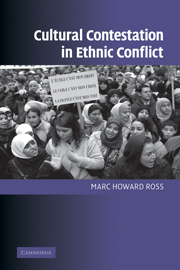Book contents
- Frontmatter
- Contents
- List of figures
- Preface
- 1 Introduction: easy questions and hard answers, what are they fighting about?
- 2 The political psychology of competing narratives
- 3 Narratives and performance: ritual enactment and psychocultural dramas in ethnic conflict
- 4 Loyalist parades in Northern Ireland as recurring psychocultural dramas
- 5 Where is Barcelona? Imagining the nation without a state
- 6 Digging up the past to contest the present: politics and archeology in Jerusalem's Old City
- 7 Dressed to express: Islamic headscarves in French schools
- 8 The politics of memory and memorialization in post-apartheid South Africa
- 9 Enlarging South Africa's symbolic landscape
- 10 Flags, heroes, and statues: inclusive versus exclusive identity markers in the American South
- 11 Culture's central role in ethnic conflict
- References
- Index
- Cambridge Cultural Social Studies
2 - The political psychology of competing narratives
Published online by Cambridge University Press: 22 September 2009
- Frontmatter
- Contents
- List of figures
- Preface
- 1 Introduction: easy questions and hard answers, what are they fighting about?
- 2 The political psychology of competing narratives
- 3 Narratives and performance: ritual enactment and psychocultural dramas in ethnic conflict
- 4 Loyalist parades in Northern Ireland as recurring psychocultural dramas
- 5 Where is Barcelona? Imagining the nation without a state
- 6 Digging up the past to contest the present: politics and archeology in Jerusalem's Old City
- 7 Dressed to express: Islamic headscarves in French schools
- 8 The politics of memory and memorialization in post-apartheid South Africa
- 9 Enlarging South Africa's symbolic landscape
- 10 Flags, heroes, and statues: inclusive versus exclusive identity markers in the American South
- 11 Culture's central role in ethnic conflict
- References
- Index
- Cambridge Cultural Social Studies
Summary
Introduction
How do people make sense of complex, emotionally powerful events and why do different, seemingly contradictory, accounts of what seems to outsiders to be the same event so frequently coexist? A short answer is that the different accounts reflect the divergent socially and culturally rooted experiences of opposing groups. Each group expresses collective memories and perceptions through narratives that seek to make sense of its experiences and to explain events in terms of their interpretations of past and future actions. Shared narratives recount and reinforce emotionally significant events and experiences within a group, sometimes through dramatic rituals but also as they frame daily interactions and behaviors.
Psychocultural narratives offer an entry point to examining intergroup conflict. In focusing on narratives I am not dismissing the importance of the structural features of states or the international system, or the competing interests of different actors. However, structures and interests are not my focus here. Narratives matter for at least four different reasons. First, a narrative's metaphors and images can tell us a great deal about how individuals and groups understand the social and political worlds in which they live and explain the conflicts in which they are involved (Roy 1994). Second, they can reveal deep fears, perceived threats, and past grievances that drive a conflict. Third, narratives are important because they privilege certain actions over others. Fourth, recounting narratives, or storytelling, is part of the processes through which communities are constructed and strengthened (Roy 2004).
- Type
- Chapter
- Information
- Cultural Contestation in Ethnic Conflict , pp. 30 - 62Publisher: Cambridge University PressPrint publication year: 2007
- 1
- Cited by



